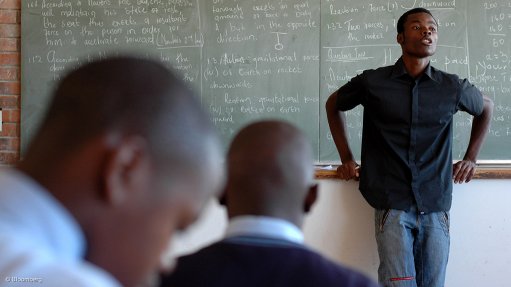
Photo by: Bloomberg
A report on school infrastructure released last week on behalf of the South African Human Rights Commission and the Centre for Child Law was inaccurate and misleading, the basic education department said on Sunday.
"The report entitled 'Mud to Bricks: A review of school infrastructure spending and delivery' dated January 2014, but released last week, is inaccurate, misleading and unhelpful," spokesperson Elijah Mhlanga said in a statement.
"Some of the content is outdated and has, in fact, been overtaken by events. Most of the challenges they raise have since been addressed."
He said the authors of the report, Carmen Abdoll and Conrad Barberton, did not contact the department to obtain the very latest information on progress made to address school infrastructure matters.
On Thursday, Barberton said the learner-school ratio (LSR) used by the basic education department was not an accurate way to evaluate education quality.
"I suppose we can be polite and say this is not a useful measure, or we can be less polite and say it's a downright misleading measure," Barberton said.
According to the report, the LSR raised the question of whether its use was creating a "perverse incentive" that drove provincial education departments to close small schools.
The report found that of the 26,789 public ordinary schools in 2000, only 24 255 remained in 2012.
In the Free State 47% of schools, a total of 1 187, had closed. In other provinces, 31% of schools in North West, 12% in Mpumalanga, and 10% in the Eastern Cape had closed.
Another problem was that the department had not publicly released data on the number of existing classrooms. The latest available figures pertained to 1996 and 2000.
According to the report, all provincial education departments had published infrastructure project lists for 2012, but in different formats.
"The Eastern Cape's list is unstructured and difficult to understand, while the Western Cape's list provides properly structured and useful information," the report reads.
This pointed to a lack of leadership by the basic education department in specifying and enforcing appropriate reporting formats and information requirements.
Mhlanga said the report relied on disparate sources of data and opinion, to produce adverse findings.
"An engagement with the DBE and provinces could have contributed to a more balanced set of findings and recommendations," he said.
Mhlanga said in the Eastern Cape alone, a further 100 schools were planned for completion in the course of the next financial year
Nationally, the department would have completed the building of over 200 schools.
The department had also strengthened its monitoring and oversight role, as well as early warning mechanisms.
"The DBE is under no illusion regarding the daunting conditions in some of our schools together with the backlogs of essential educational spaces and services," he said.
"We have made no secret of it at all and are only too happy to account to the public."